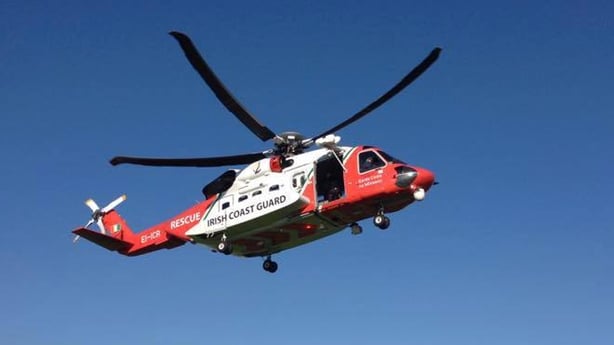The Irish Coast Guard has postponed the start of a new Search and Rescue (SAR) helicopter operating system at their base in Co Sligo after safety concerns were raised about the timing of the transition between two different contractors.
The Coast Guard operates four SAR bases across Ireland in Sligo, Shannon, Waterford and Dublin.
In August 2023, Bristow Helicopters won a tendering competition to run the country's airborne rescue service in a contract that will cost about €670m over ten years.
Bristow had been due to take over from previous contractor CHC Ireland at the Sligo base last week - on 14 February.
However, this has now been postponed until the end of April.
Former head of the Irish Coast Guard Chris Reynolds has warned there are serious safety risks for both staff and the public due to the timing of the new service.
Speaking to RTÉ's Morning Ireland, Mr Reynolds said he believed the timeline to train SAR staff on the new helicopter and operating system was too short.
The Department of Transport has now confirmed that "an agreement is in place that will ensure uninterrupted 24/7 cover from Sligo to end-April".
In a statement, it said: "The department will not allow risks to be taken in a rush to meet contractual deadlines.
"To reiterate, safety of crew, citizens and mariners is the overarching priority," the statement added.
"If the department recognises the need to revise transition dates to ensure overall safety, this will be done without hesitation and expects full cooperation of both contractors to facilitate revised transition timelines."
Mr Reynolds said: "They haven't given themselves enough time and if you don't give yourself enough time you have to rush transition and rushing transition leads to accidents.
"We're already seeing creeping accidents come into the Bristow's service even though it is only a few weeks old ... which makes me think that a bigger accident is only around the corner.
"It is a very hostile environment on the west coast of Ireland especially in winter night time and you have to really be at the top of your game."

In a statement, Bristow said that "training and operating in dynamic environments means minor injuries can and do occur.
"There have been a couple of minor injuries reported during training, and these have been managed in accordance with our globally recognised safety procedures," Bristow added.
In his former role, Mr Reynolds gave each of the four SAR bases in the country three months each to train on the new system.
Even with a 12-month lead in time, they still required an extension.
Although no longer employed at the Coast Guard, Mr Reynolds said he is in regular contact with many people who work as crew members in all four SAR bases.
The transition scheme to the new Bristow system is already behind its timeline.
The Shannon SAR base, the first one to transition to the Bristow system, went live on 8 December, several weeks later than it should have been.
That base is currently not fully operational as it is only running a 12-hour day service, not a 24-hour one.
The Department of Transport has said that the Shannon SAR base will be operational 24/7 by the end of February.
It said the Coast Guard helicopter base in Shannon is currently operating out of temporary facilities while the permanent base is under renovation and upgrade works.
The final date for all four search and rescue bases to transition to the new system remains 30 June.
However, a statement from the department said that it will not allow risks to be taken in a rush "to meet contractual deadlines".
"If the Department recognises the need to revise transition dates to ensure overall safety and will do so without hesitation and expects full cooperation of both contractors to facilitate revised transition timelines."







